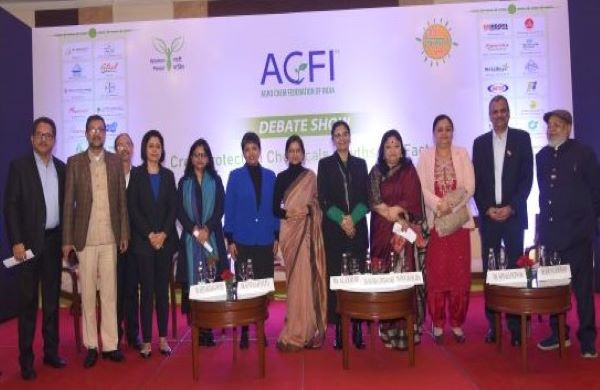India uses just a one third quantity of crop protection chemicals per hectare in comparison to China

The Agro Chem Federation of India (ACFI) organized a panel discussion to clear the myth about the use of pesticides in the country. The deliberation aimed to bring the truth that India does not use excessive chemicals in farming.
India ranks second in the world in agriculture production after China, but it ranks 12th in the use of pesticides worldwide after countries like the USA, France, Spain, Italy, China and Germany.
An all-female panel comprising of scientists, lawyers, experts on regulatory framework, civil society members, journalists and columnists, along with industry body members debated various myths related to crop protection chemicals and agreed on educating the stakeholders, especially the farmers and urban intelligentsia and invest in research & development to improve the crop yield to ensure food security in India.
Dr. Kalyan Goswami, Director General of ACFI, said: “As an industry, we are here to protect the plant and millions of lives from hunger and associated risks.”
Initiating the discussion, Dr. Deepa Batra Kathuria, Regulatory Head – FMC India, busted a number of myths against the use of crop protection chemicals through the use of facts in her presentation. “The industry is being blamed for myths like usage of pesticides in large quantities, reducing crop yield, rising number of cancer cases etc, whereas the facts are otherwise. For example, India’s grain production is increasing every year, in terms of cancer cases even a non-agriculture country like Singapore has more percentage of cases than India. Similarly, India uses just a one third quantity of crop protection chemicals per hectare in comparison to China.”
Presenting judicious view of the industry, Mamta Rani Jha, Senior Partner, Head – Litigation & Opposition, Inttl Advocate was of the view that as a country we cannot survive without crop protection chemicals because the pests can reduce the crop yield from about 30 per cent to more than 70%. “In such a situation, our food security and goal of a hunger-free society will be in jeopardy.”
Representing the civil society in the panel and drawing upon her field experience, Sonali Patnaik, Director, Arupa Mission Research Foundation, highlighted the issues of excessive use of chemicals by farmers or laborers on the want of knowledge and lack of safety kits when laborers sprinkle the chemicals or pesticides. “Crop protection chemical industry should increase efforts to ensure the safety of farmers and laborers on the one hand and ending hunger and malnutrition on the other hand, “exhorted Patnaik.
Voicing the concerns of common citizens, Dr. Kuntala Sengupta, a Columnist said, “While hearing other panelists, a lot of myths I was carrying have been busted, however, I would suggest the industry to create awareness about this on large scale, so that common citizens of India could benefit and do not fall prey to misinformation or myths on crop protection chemicals.”
Speaking on the hype around organic agriculture, Dr. Kiran K. Khokhar, In-charge of the Regional Soil Testing lab at Karnal, Haryana clarified that any crop needed around 60% of nutrients, including nitrogen and with the number of cattle reducing in villages, it was not possible to meet the need by using only cattle manure. “While organic farming as an option of sustainable farming can continue, however, it is impossible to generate the crop yield required for our population. Thus, crop protection chemicals are essential to meet our food needs.”
Laxmidevi A., a Senior Journalist with Press Trust of India, advocated the middle ground and appealed to the industry to be united in order to weed out the counterfeited chemicals being pushed by non-industry body members.
The panel was moderated by Ruchika Chitravanshi, Assistant Editor of Business Standard.
Subscribe to our newsletter & stay updated.